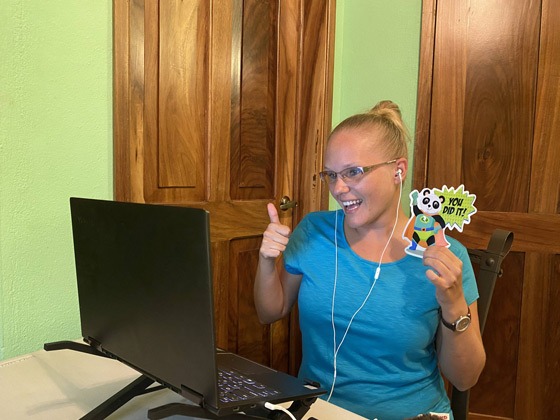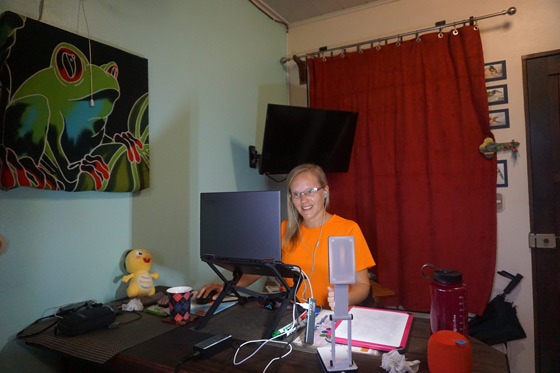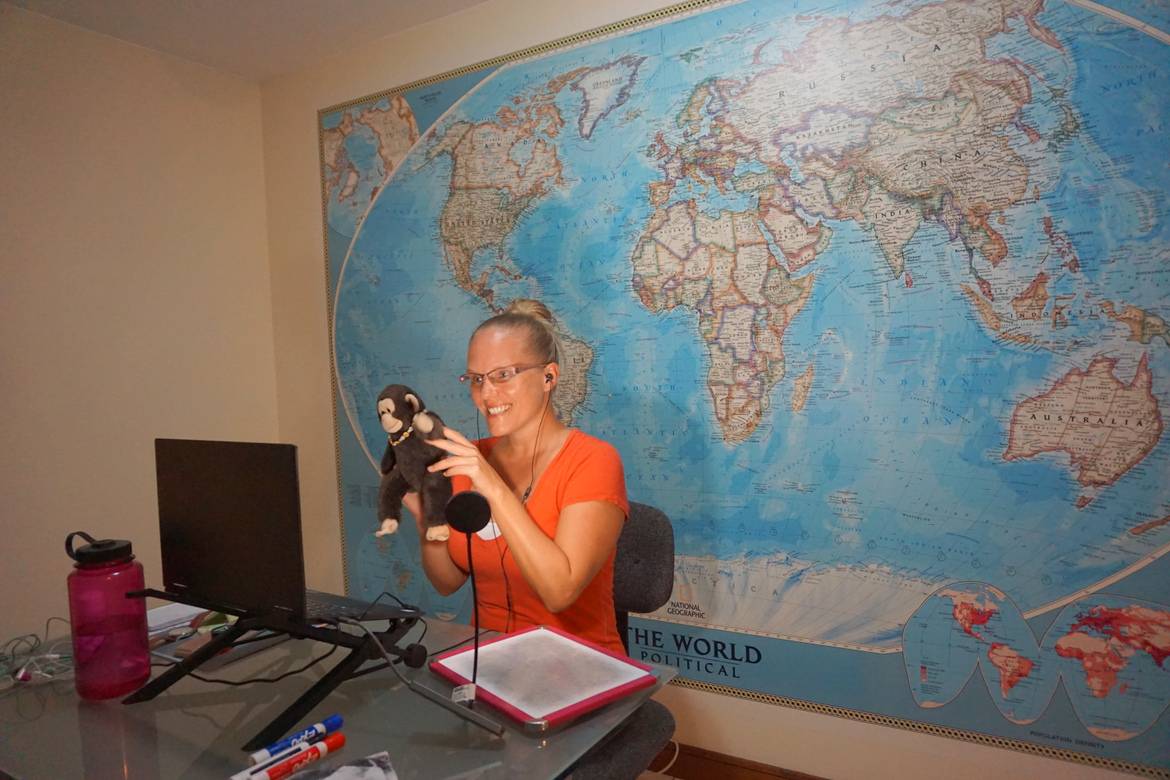Inspired by the idea of traveling and a love of world festivals, Bridge alum Rachel Story, from the U.S., took the leap and became a digital nomad. This led her to launch and grow her own virtual English teaching business while globetrotting. Rachel is now Bridge’s Teacherpreneur Academy Instructor & Coach, supporting independent teachers in their careers. She discusses her experience of becoming a traveling English teacher and her tips for achieving more freedom and flexibility in teaching English online.
Hi, Rachel! Can you tell us a bit about yourself?
I’m originally from a small town in Tennessee called Johnson City. I haven’t lived there in a long time, but I also haven’t settled anywhere else. So, when someone asks me where I’m from, it’s kind of a long-winded answer. We currently don’t live in one location because we’re digital nomads and we don’t have a place of our own.
Discover the 10 best places for digital nomads to live, teach English online, and travel.
How did you decide to become a digital nomad?
In 2010, my husband, Sasha, and I moved to China to teach English, and we wound up living in China for a total of five years. Then, we took a gap year where we quit our jobs in Beijing, put all of our stuff into storage, and just traveled for 14 months straight. That’s where we got that first taste of the digital nomad life. When we finished that gap year, we thought we would be fine with returning to normal life and working regular full-time jobs. But two weeks into that, we realized it was really hard to shake that intense feeling of freedom that you get from traveling full-time. So, we worked for a year in Kunming, China, saving up money and preparing for what was next. Then, we actually moved to Bali and wound up living on the island of Bali for about nine months.
While we were living in Bali, I found a job teaching English online. And for the last five years, we’ve just been living and traveling as digital nomads, teaching English online and blogging.
Want to know your options for teaching English online? Read about working with online tutoring companies, marketplaces, or independently, and weigh your options.

You also created your blog, Grateful Gnomads. What inspired you to start this blog?
It was our gap year that inspired us to start the blog. We started it as a way to document our travels and to keep our friends and family updated on our whereabouts.
Our blog is a travel blog for both new and experienced digital nomads, as well as live music lovers because Sasha and I are both huge fans of live music and we met at a music festival. We write tips and advice for digital nomads, and we also write travel guides for live music fans because we love to travel to see our favorite bands.
Looking for ways to monetize your independent teaching business? Read tips for creating multiple income streams that range from starting a blog to writing curricula.
How did COVID-19 affect you as a digital nomad teacher?
At the beginning of the pandemic, it made travel difficult. Nevertheless, our jobs teaching English online with VIPKid were fine. And then, as the pandemic went on, once the vaccine was introduced, travel became easier once again. However, it completely upended our online English teaching jobs when China banned online English teachers from overseas.
In the spring of 2020, I joined Lingoo, an online teacher marketplace. It was relatively new at the time. When China’s ban began, I had already established myself on that platform. I had a steady schedule of students and I had reviews on that platform. So, even though VIPKid was our main source of income, it wasn’t the only one by that point. I just started putting more effort into Lingoo and building my business on that platform.
Learn from the experts! TEFL Digital nomads discuss the ins and outs of traveling and teaching.

You are now Teacherpreneur Academy Instructor & Coach! Why should aspiring independent teachers join this program?
The Teacherpreneur Academy is incredibly comprehensive and is designed for any online English teacher interested in becoming an independent teacherpreneur or expanding their independent online teaching business. The academy is for teachers of any experience level; it takes members from Point A to Point Z of the entire process. Members transitioning to independent careers learn to develop an entrepreneurial mindset, choose a teaching niche, and develop a business plan. Experienced independent teachers learn about the tools and strategies they need to scale and expand their business. All members learn how to pivot and develop smart business practices.
The best part about the academy is the live events. We have two live workshops and a live networking and Q&A event every month. The workshops dive deep into the skills and know-how of being an independent teacherpreneur. The networking events are a great opportunity to mingle with other members and get extra support. As the Instructor and Coach, I personally create and lead each event. Getting to know the members is the best part for me!
What are some of the common questions or concerns aspiring teacherpreneurs ask?
The most common questions and concerns I hear are related to getting started and finding a niche. Many people get stuck at the beginning with these questions and feel overwhelmed – myself included!
A teacherpreneur shares six reasons to become an independent ESL teacher.
What are the top tips you give to aspiring teacherpreneurs?
-
The best way forward is to begin by freelancing with an online language school or tutoring for an online marketplace. By doing this, you’re taking action, which breeds motivation, and it’s the motivation that keeps you going when you come to something challenging. Once you’re teaching independently, you start feeling the excitement and fulfillment that comes with helping students learn and grow.
-
Being a freelancer or marketplace tutor gives you the space to figure things out. You’ll discover the types of students you genuinely enjoy working with and uncover your unique teaching style. It’s like trying on different hats to see which one fits you best.
-
This trial and error phase helps you immensely when it comes to choosing your niche and learning how to market yourself effectively. You’ll get a clearer picture of what sets you apart, your strengths, and how to highlight them in your business.
-
We have lessons and resources to help you start freelancing or tutoring. It’s not all about jumping in the deep end headfirst and starting a business!
Download the free infographic, Three Ways to Be an Independent Online English Teacher.

You took Introductory Educator, Teaching Business English, Error Correction, and Teaching IELTS Exam Prep courses. Why did you decide to take these courses?
Back when I was living in China, I got my initial online TEFL certification from Bridge. Once they introduced the Specialized Certification and Micro-credential courses, I was very excited about them because I think that continuing your professional development as an ESL teacher is really important. I’ve always been interested in teaching Business English and IELTS test prep, and so that’s why I took those courses. Then, I took the Error Correction Micro-credential course to become a better teacher because correcting errors is one of those sticky areas of teaching English.
To sum it up, the reasons I took these courses include:
-
To have niches as a teacher and have more specialized offerings.
-
To set myself apart from other online English teachers so I could raise my rates.
-
To launch a teacherpreneur business and not work with any companies.
In this video, Rachel shares how her TEFL certification made her a competitive job candidate:
How did these courses help you professionally?
I learned how to teach Business English. I have a Minor in Business from a university, but it’s one thing to learn the basics of business yourself, and it’s a whole other thing entirely to try and teach Business English to someone who’s learning English. So, the Business English course showed me how I can best teach these skills.
The IELTS Exam Prep Micro-credential gave me more information about the exam and how to set my students up for success on the IELTS.
Learn how you can start teaching IELTS exam prep.
What’s next for you?
In terms of teaching English online, I’m still focusing on building my business on Lingoo and exploring other ways to market my services and grow my portfolio of students.
In terms of travel, we are currently in Asheville, North Carolina, and we’re going to be here until about the middle of February. Then, we’re going to New Orleans for Mardi Gras because we really enjoy celebrating Carnival and Mardi Gras. New Orleans has always been on our Carnival bucket list. After that, we’re returning to Mexico at the end of February.
We want to spend more time in Oaxaca City, Mexico. Sasha is currently working on writing a feature article about Oaxaca City for another online publication, and we have the freedom and flexibility to be there and experience the city for ourselves, which is going to make his article that much better.
Learn about tips for choosing an LMS or learning platform for your online English teaching business.

What’s your advice for someone who wants to become a digital nomad?
1. Be adaptable.
Anything can change anytime, so you always need to have a backup plan.
2. Don’t be afraid to experiment and try different things.
Think of it as throwing things at the wall to see what sticks. And this goes for anything. For teaching English online, try working with a variety of platforms before launching your own business.
Essentially, there are three ways to teach English online:
-
Freelancing with a language company that sets the rates and provides the curriculum.
-
Tutoring for an online teacher marketplace that takes care of marketing but you set your rates and plan your lessons.
-
Being a teacherpreneur and setting y our rates, doing your marketing, and creating your lessons for your own online English teaching business.
Find out if teaching English with a company or working for yourself is right for you.
3. If you’re just getting started, it helps to begin your independent journey by teaching with companies.
Apply to as many different companies as you’re qualified to teach with, and then just go from there. Figure out what you like and then just keep doing more of that.











